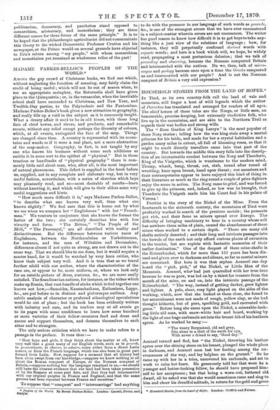MADAME PARKES-BELLOC'S PEOPLES OF THE WORLD.*
AMONG the gay crowd of Christmas books, we find one which,
without neglecting the function of amusing, may fairly claim the credit of being useful ; which will not be out of season when, to use an appropriate metaphor, the Saturnalia shall have given place to the Quinquatria ; or, in the vernacular, when the inevitable
school shall have succeeded to Christmas, and New Year, and Twelfth-Day parties, to the Polytechnic and the Pantomime. Madame Parkes-Belloc's book gives a new attraction to geography, and really fills up a void in the subject as it is commonly taught. What a dreary affair it used to be in old times, with those long lists of chief towns, and rivers, and products, and remarkable events, without any relief except perhaps the diversity of colours, which, at all events, variegated the face of the map. Things are changed since then. A country is represented with its moun- tains and woods as if it were a real place, not a mere abstraction of the map-maker. Geography, in fact, is not taught by any one who knows his business without some such additions as entitle it in some sort to the epithet of "physical." But in these
treatises or handbooks of " physical geography " there is com-
monly little said about man, who, after all, is the most important of natural phenomena. This defect is supplied in the book before us, supplied, not in any complete and elaborate way, but in very useful fashion, nevertheless, with a series of sketches which boys
may pleasantly read, and so—most desirable of results—learn without knowing it, and which will give to their elders some very useful suggestions and hints.
" How much more difficult it is," says Madame Parkes-Belloc, " to describe what one knows very well, than what one knows slightly." We feel sure that this is borne out by what we see when we compare her " Englishman " with her " French- man." We venture to conjecture that she knows the former the better of the two ; she certainly describes him with less vivacity and force. " The Briton," " The People of the Midi," " The Provencal," are all described with reality and distinctiveness. But the difference between various races of Englishmen, between the Northumbrian or Yorkehireman, for instance, and the man of Wiltshire and Devonshire, differences almost if not quite as strong, are not drawn out in the same way. That we should like to see done, but it would require a master hand, for it would be watched by very keen critics, who know their subject very well. And it is true that as we travel further afield with our author, where the characteristics of the race are, or appear to be, more uniform, or, where we look only for an outside picture of dress, customs, &c., we are more easily satisfied. The Scandinavian nations, for instance, or the tribes which make up Russia, that vast bundle of sticks which is tied together one knows not how,—Samoides, Kamtschatkans, Esthonians, Lapps, &c., are put before us in distinct and picturesque outlines. Any subtle analysis of character or profound ethnological speculations would be out of place ; but the book has been evidently written with industry and care, and its readers may at all events go to its pages with some confidence to learn how some hundred or more varieties of their fellow-creatures feed and dress and amuse and support themselves, and demean themselves to each other and to strangers.
The only serious criticism which we have to make refers to a passage in the preface. It runs thus :—
" Most boys and girls, if they think about the matter at all, know very well that a great many of our English words, such as to precede, to procrastinate, to observe, to admire, come either from a direct Latin source, or from the French language, which has also been in great part formed from Latin. Now, suppose for a moment that all history had been clean swept from our knowledge,—suppose we knew nothing at all about the Roman conquest of Europe, or the Norman conquest of Britain,—suppose nothing but the language remained to us, we should still have the clearest evidence that our land had been taken possession of by the Romans at some past date, and that they had intermarried with our original peoples in France and England, and that the same process had been repeated between France and ourselves."
To suppose that "conquest" and "intermarriage" had anything
• Peoples of the World. By Bessie Parkes-Belloc. London: Cassell, Fetter, and Galpin. to do with the presence in our language of such words as precede,. &c., is one of the strangest errors that we have ever encountered in a subject-matter wherein errors are not uncommon. The writer has good reason to know how difficult it is to get boys to take any- thing like a just view of the relations of language ; how, for instance, they will perpetually confound derived words with. cognate words ; and here is a book which will, we hope, be widely read, propagating a most portentous delusion ; that we talk of preceding and observing, because the Romans conquered Britain, and intermarried with the natives. Do we, then, talk of micro- scopes and geology because once upon a time the Greeks conquered. us and intermarried with our people ? And is not the Norman. conquest of Britain a very odd expression?






































 Previous page
Previous page